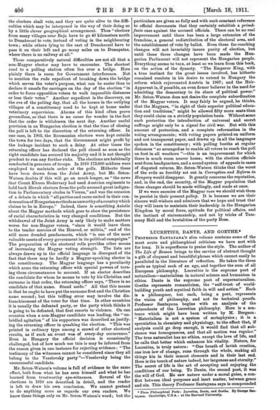LUCRETIUS, DANTE, AND GOETHE.*
PROFESSOR SANTAYANA'S slim volume contains some of the most acute and philosophical criticism we have met with for long. It is superfluous to praise the style. The author of The Life of Reason brings to the service of abstract thought a gift of eloquent and beautiful phrase which cannot easily be paralleled in the literature of reflection. He takes the three poets as typical each of an age, and together the sum of all European philosophy. Lucretius is the supreme poet of naturalism—materialism in natural science and humanism in ethics. Dante is the supreme poet of supernaturalism. Goethe represents romanticism, the "self-trust of world- building youth and mystical faith in will and action." Each is a philosopher, but each, being a poet, represents the vision of philosophy, and not its technical proofs. Professor Santayana begins with an analysis of the antecedents of the Lucretian philosophy. Here is a sen- tence which might have been written by M. Bergson: " Materialism is not a system of metaphysics ; it is a speculation in chemistry and physiology, to the effect that, if analysis could go deep enough, it would find that all sub- stance was homogeneous, and that all motion was regular." The true naturalist has no ethics, except the love of life, and he calls that better which enhances his vitality. Nature, for Lucretius, is truly nature: " One breath of lavish creation, one iron law of change, runs through the whole, making all things kin in their inmost elements and in their last end. Here is the touch of nature indeed, her largeness and eternity." The secret of life is the art of accepting and enjoying the conditions of our being. To Dante, the second poet, it was the will of God. He saw nature under a moral guise, a con- flict between ideal purposes and inert matter, between grace and sin. This theory Professor Santayana says is compounded • Three Philosophical Ponts Lucretius, Dante, and Goethe. By George San- tayana. Cambridge, II.B.A. ; at the Harvard University,
partly of Greek natural and moral philosophy and partly of the Hebrew consciousness of a providential history. Dante takes Aristotle's classification of the virtues and vices and adds two more--heresy and original sin :- "The Divine Comedy marks high noon in that long day-dream of which Plato's dialogues mark the beginning ; a pause of two thousand years in the work of political reason, during which the moral imagination spun out of itself an allegorical philosophy, as a boy left at home during a rainy day, with books too hard and literal for his years, might spin his own romance out of his father's histories and might define with infantile precision his ideal lady- loves, battles and kingdoms. The Middle Age saw the good in a vision. It is for the new age to translate those delightful symbols into the purposes of manhood."
Dante, says Professor Santayana, gives us a philosophical goal, and we have to retrace the journey; Goethe gives us a philosophic journey, and we have to divine the goal. Faust has the romantic belief in " magic "—that somehow personal will can override the laws of God and nature. Goethe, though the last of the poets in time, gives us the first stage of thought —" the turbid flux of sense, the cry of the heart." Lucretius carries us a step further to the understanding of the causes of things ; Dante further still to the moral truth of things. But no one alone is satisfying, for Goethe gives us the fuller volume of life, and, judged by their content, the solutions of Dante and Lucretius are alike thin and fantastic. In the per- fect poet the insights would be superimposed. " Experience in all its extent . . . should still be at the foundation. But as the extent of experience is potentially infinite, as there are all sorts of worlds possible, and all sorts of senses and habits of thought, the widest survey would still leave the poet where Goethe leaves us, with the sense of an infinity beyond." We commend Professor Santayana's analysis of Faust ; it is one of the best things we have read on the subject. The whole book is full of acute and pregnant criticism, and the manner is so delightful that to quote one sentence is to wish to quote all.











































 Previous page
Previous page